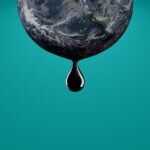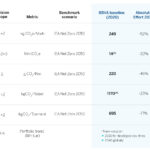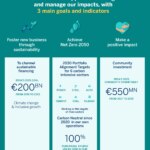BBVA commits to reduce emissions from its oil and gas client portfolio by 30% by 2030
BBVA is committed to clean energy and will support the energy industry in its transition. The bank has therefore announced it will reduce emissions from its oil and gas portfolio by 30% by 2030. This commitment is in addition to the bank's 2021 targets in four other carbon-intensive sectors and the decision to stop financing coal companies, in line with the zero net emissions banking alliance (NZBA).
BBVA's decarbonization targets: What do they mean and what is their scope?

“The energy industry is essential to the economic and social development of the countries where we operate. With this commitment we seek to support the transition to more sustainable business models," explained Luisa Gómez Bravo, Global Head of Corporate & Investment Banking at BBVA.
BBVA will align its exposure to the oil and gas sector according to the 2050 net zero emissions scenario following the absolute emissions metric. Between December 2021 and December 2030, it will reduce emissions from its credit portfolio in exploration, drilling and extraction activities in this sector by 30% in accordance with the most stringent scenario at this time (not to exceed a 1.5ºC temperature increase in 2050). In addition, BBVA has committed not to provide financing directly related to exploration, drilling and extraction projects in this industry.
By taking this step in a key sector such as the energy industry, BBVA moves forward in its commitment to be a carbon neutral bank by 2050, not only in its own business, where it has already been carbon neutral since 2020, but also in its borrowers’ activities.
To enable its clients to reduce emissions, BBVA will first help them create robust plans and set clear emission reduction targets. Secondly, BBVA will support clients in their transition to other forms of low-carbon energy generation through the necessary investments that will facilitate their diversification and decarbonization.
This announcement is aligned with the goal of accelerating the green transition in Europe in line with the REPowerEU plan and the International Energy Agency's (IEA) guidelines. According to the IEA’s Net-Zero Emissions by 2050 Roadmap, a "massive and immediate investment in clean and efficient energy" is needed. According to the report, "if renewables grow successfully soon enough, the result will be that demand for oil and gas will be reduced, and there will be no need to develop new fields."
In 2019, BBVA undertook sustainability as one of its strategic priorities and in 2021 announced the creation of its Global Sustainability area. In that year, the bank announced its goal of eliminating its exposure to coal customers by 2030 in developed countries and by 2040 globally (as indicated in the BBVA Environmental and Social Framework). BBVA subsequently set intermediate targets to decarbonize its portfolio in four emissions-intensive sectors by 2030. These sectors, together with coal, accounted for 60% of global carbon emissions.
Target Breakdown

(1) The percentages are the Compound Annual Growth Rate between the baseline year and 2030.
(2) BBVA baseline year 2021 for oil and gas (O&G).
(3) Absolute emissions from oil and gas were calculated using the PCAF methodology for the calculation of the attribution factor. The main source of emission data was the database provided by Asset Resolution, which has information on production and emissions by asset for the companies included in the analysis. For those clients for which information was not available, an emission estimate was calculated, using an attribution factor per euro financed.
(4) In the original 2021 publication, the initial figure for the steel sector was calculated using data provided by Asset Resolution. It did not include scope 2 emissions for some clients, which could be relevant in this sector. The new calculation incorporates these emissions for all clients - both for the starting point and in the estimation of the targets, maintaining the reduction percentage that was set in 2021.
BBVA is a member of the Net-Zero Banking Alliance (NZBA). Banks in this international alliance commit to ensuring that all of their credit and investment portfolios are neutral in net emissions of greenhouse gases by 2050, in line with science and the most ambitious targets of the Paris Agreement.
In 2021, BBVA announced that it was doubling its goal of mobilizing sustainable financing from €100 billion to €200 billion over the 2018-2025 period.
In 2022, BBVA has reached the top position in the Dow Jones Sustainability Index (DJSI), obtaining the highest score among financial institutions, alongside a South Korean bank.
